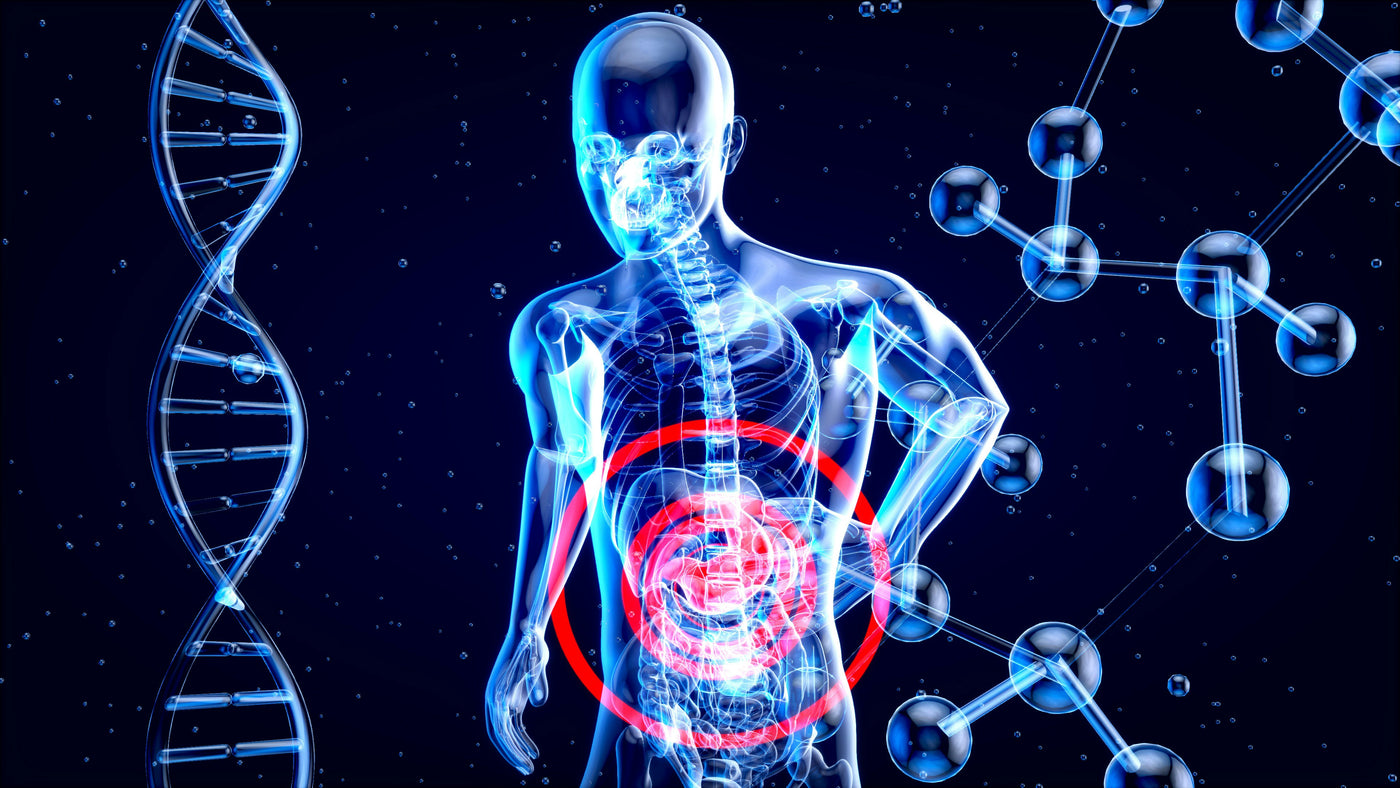The digestive system, also known as the gastrointestinal (GI) tract, is a complex network of organs responsible for processing the food we eat. Its main function is to break down food into essential nutrients that our bodies can absorb and utilize for various functions.
As we age, our body's ability to absorb nutrients from food decreases significantly. This is due to changes in the digestive system's structure and function. Reduced nutrient absorption can lead to nutrient deficiencies, impaired bodily functions, and overall health complications. It is important to address this issue to maintain optimal health in old age.
How does the GI tract change with age?
The GI tract undergoes several changes as we age that impact its efficiency. A decline in digestive enzyme production, a decrease in absorptive cells, a decrease in blood flow to the digestive organs, and a slowing down of digestion are examples of these changes. In this section, we will examine these changes more closely.
- Decreased Stomach Acid Production: Stomach acid, or hydrochloric acid, plays a pivotal role in breaking down food, especially proteins. With age, stomach acid production decreases, impacting the absorption of critical nutrients like calcium, iron, and vitamin B12 [1] [2].
- Changes in Digestive Enzymes: As we age, the enzymes that assist the digestive process by breaking down carbohydrates, fats, and proteins may decrease, which will result in impaired digestion as well as reduced nutrient absorption [3].
- Slower Digestion: As people age, the transit time through the digestive system tends to increase. This means that food stays in the digestive system longer, which can result in a reduction in nutrition absorption. Slower digestion may also result in constipation and other digestive problems as well [4] [5].
- Medications and Medical Conditions: As we age, it is common for older adults to take several medications to manage their health conditions. Unfortunately, some of these medications can interfere with the absorption of nutrients. For example, medications used to treat acid reflux and heartburn can decrease stomach acid production, which is essential for breaking down food and absorbing nutrients. This can lead to malnutrition, even if the individual is consuming a balanced diet. Furthermore, certain medical conditions,s such as celiac disease or Crohn's disease can also impact nutrient absorption in the gastrointestinal tract. In celiac disease, the immune system attacks the lining of the small intestine when gluten is consumed, which damages the villi, tiny hair-like projections in the small intestine that absorb nutrients. As a result, people with celiac disease may not absorb enough vitamins and minerals from their food, even if they have a healthy diet. Similarly, in Crohn's disease, inflammation in the GI tract can impair nutrient absorption, leading to malabsorption and nutrient deficiencies [6].
It's important for older adults to be aware of the potential side effects of their medications and to speak with their healthcare provider if they are experiencing symptoms of malnutrition. A registered dietitian can also help with developing a nutrient-dense diet plan that considers any medication and medical conditions that may impact nutrient absorption.
How does GI aging impact people as they age?
As we age, our body goes through several changes, including a decrease in the efficiency of our gastrointestinal (GI) tract. This leads to a noticeable reduction in the absorption of key nutrients, which can result in nutrient deficiencies or inadequacies. This is a significant concern among older adults, who are particularly vulnerable to decreased absorption of crucial nutrients like calcium, vitamin D, and vitamin B12.
Nutrient deficiency and inadequacy are two different concepts that are often used interchangeably, but they have different meanings.
Nutrient deficiency refers to a situation where the body is not getting enough of a particular nutrient, meaning the body has a shortage of that nutrient. This can happen when a person's diet lacks a particular nutrient, or the body is not absorbing enough of it. Nutrient deficiencies can result in various health problems, depending on the nutrient in question. Examples of nutrient deficiencies include iron deficiency anemia, vitamin C deficiency (scurvy), and vitamin D deficiency (rickets).
Nutrient inadequacy refers to a situation where the body is not getting enough of a particular nutrient to meet its daily requirements, but it is not necessarily deficient in that nutrient. Inadequate nutrient intake can lead to various health problems over time, but these problems are typically not as severe as those associated with nutrient deficiencies. Examples of nutrient inadequacies include not getting enough dietary fiber or not consuming enough calcium to maintain healthy bones [7].
Calcium is a vital nutrient for maintaining bone health, and vitamin D helps the body absorb calcium. Unfortunately, as we age, the body's ability to absorb calcium and vitamin D decreases, leading to a higher risk of bone-related issues like osteoporosis and fractures. Vitamin B12 is also essential for maintaining healthy nerve cells and red blood cells. As we age, the body's ability to absorb vitamin B12 from food decreases, leading to a higher risk of anemia and nerve damage. Furthermore, older adults may also have an increased risk of nutrient deficiencies due to factors such as medication use, changes in appetite, and declining economic status. This makes it crucial for older individuals to pay close attention to their nutrient intake and speak with their healthcare provider about any concerns they may have [8].
What Can We Do About GI Aging and Inefficient Nutrient Absorption with Age?
Maintaining an optimal balance of nutrients becomes increasingly crucial as we age. To address the challenges associated with GI aging and dwindling nutrient absorption, incorporating a multifaceted approach into daily life can significantly contribute to overall well-being.
- Adopt a Nutrient-Rich Diet: Prioritize a well-balanced diet filled with a diverse array of nutrient-dense foods. Emphasize the inclusion of fruits, vegetables, lean proteins, whole grains, and dairy products or suitable alternatives. These dietary choices not only provide essential vitamins and minerals but also help compensate for the reduced efficiency of nutrient absorption in the aging GI tract [9].
- Consider Dietary Supplements: In certain instances, dietary supplements may be advisable to counteract specific nutrient deficiencies. Before incorporating supplements into your routine, seek guidance from a healthcare provider to identify the most suitable options for your individual needs. Notably, Healthycell MicroGel™ supplements stand out as a cutting-edge supplement designed to enhance nutrient absorption efficiently. Two of Healthycell's most popular products include Bioactive Multi and Vegan Essentials. These unique, ultra absorbable multivitamins are designed specifically to help fill in dietary gaps.
- Prioritize Hydration: Adequate hydration is fundamental for supporting digestion and nutrient absorption. Make a conscious effort to maintain proper fluid intake throughout the day, as this simple yet impactful practice contributes to overall digestive health.
- Manage Medications Effectively: Engage in open conversations with your healthcare provider about any concerns regarding medications that might affect nutrient absorption. Collaboratively explore potential adjustments to medication regimens or alternative treatments that ensure optimal nutrient uptake.
- Regular Health Check-Ups: Schedule routine health check-ups to monitor and address potential nutritional deficiencies or emerging digestive issues. Proactive healthcare engagement allows for early identification and timely intervention, promoting sustained well-being.
- Embrace a High-Fiber Diet: Incorporate an ample amount of dietary fiber into your daily meals. A fiber-rich diet not only promotes regular bowel movements but also mitigates the risk of constipation, contributing to improved digestive health [10].
- Lifestyle Modifications: Integrate physical activity into your routine and adopt stress management practices to support overall digestive well-being. A combination of regular exercise and stress reduction techniques contributes not only to digestive health but also to a holistic sense of well-being [11].
Taking a proactive stance toward nutrition and digestive health is paramount for older adults aiming to secure the essential nutrients vital for maintaining robust health. Consulting with a healthcare provider or registered dietitian ensures personalized guidance tailored to individual health and nutritional needs, empowering individuals to navigate the nuances of aging with resilience and vitality.
As we age, our digestive system undergoes changes that impact nutrient absorption efficiency. To navigate this shift, adopting a proactive approach is key. The strategies we've discussed, from embracing a balanced diet to considering supplements like Healthycell's MicroGel™ supplements, provide a comprehensive guide for optimizing nutrient absorption in later years. By understanding and addressing these various aspects, individuals can actively manage their digestive health, promoting overall well-being.
About the Author
Amanda Herlocker MS, RDN, LDN is a Registered Dietitian with a Master's in Nutrition Science. As the founder of The Queen City Dietitian, LLC in Charlotte, NC, she brings a depth of knowledge to her writings. Amanda's expertise spans clinical nutrition, innovative recipe development, and evidence-based content creation for various platforms.
References
- Dumic I, Nordin T, Jecmenica M, Stojkovic Lalosevic M, Milosavljevic T, Milovanovic T. Gastrointestinal Tract Disorders in Older Age. Can J Gastroenterol Hepatol. 2019 Jan 17;2019:6757524. doi: 10.1155/2019/6757524. PMID: 30792972; PMCID: PMC6354172.
- Cristina NM, Lucia D. Nutrition and Healthy Aging: Prevention and Treatment of Gastrointestinal Diseases. Nutrients. 2021 Nov 30;13(12):4337. doi: 10.3390/nu13124337. PMID: 34959889; PMCID: PMC8706789.
- Rémond D, Shahar DR, Gille D, Pinto P, Kachal J, Peyron MA, Dos Santos CN, Walther B, Bordoni A, Dupont D, Tomás-Cobos L, Vergères G. Understanding the gastrointestinal tract of the elderly to develop dietary solutions that prevent malnutrition. Oncotarget. 2015 Jun 10;6(16):13858-98. doi: 10.18632/oncotarget.4030. PMID: 26091351; PMCID: PMC4546438.
- Cristina NM, Lucia D. Nutrition and Healthy Aging: Prevention and Treatment of Gastrointestinal Diseases. Nutrients. 2021 Nov 30;13(12):4337. doi: 10.3390/nu13124337. PMID: 34959889; PMCID: PMC8706789.
- Soenen S, Rayner CK, Jones KL, Horowitz M. The ageing gastrointestinal tract. Curr Opin Clin Nutr Metab Care. 2016 Jan;19(1):12-8. doi: 10.1097/MCO.0000000000000238. PMID: 26560524.
- Dumic I, Nordin T, Jecmenica M, Stojkovic Lalosevic M, Milosavljevic T, Milovanovic T. Gastrointestinal Tract Disorders in Older Age. Can J Gastroenterol Hepatol. 2019 Jan 17;2019:6757524. doi: 10.1155/2019/6757524. PMID: 30792972; PMCID: PMC6354172.
- Kiani AK, Dhuli K, Donato K, Aquilanti B, Velluti V, Matera G, Iaconelli A, Connelly ST, Bellinato F, Gisondi P, Bertelli M. Main nutritional deficiencies. J Prev Med Hyg. 2022 Oct 17;63(2 Suppl 3):E93-E101. doi: 10.15167/2421-4248/jpmh2022.63.2S3.2752. PMID: 36479498; PMCID: PMC9710417.
- Cristina NM, Lucia D. Nutrition and Healthy Aging: Prevention and Treatment of Gastrointestinal Diseases. Nutrients. 2021 Nov 30;13(12):4337. doi: 10.3390/nu13124337. PMID: 34959889; PMCID: PMC8706789.
- Rémond D, Shahar DR, Gille D, Pinto P, Kachal J, Peyron MA, Dos Santos CN, Walther B, Bordoni A, Dupont D, Tomás-Cobos L, Vergères G. Understanding the gastrointestinal tract of the elderly to develop dietary solutions that prevent malnutrition. Oncotarget. 2015 Jun 10;6(16):13858-98. doi: 10.18632/oncotarget.4030. PMID: 26091351; PMCID: PMC4546438
- Rémond D, Shahar DR, Gille D, Pinto P, Kachal J, Peyron MA, Dos Santos CN, Walther B, Bordoni A, Dupont D, Tomás-Cobos L, Vergères G. Understanding the gastrointestinal tract of the elderly to develop dietary solutions that prevent malnutrition. Oncotarget. 2015 Jun 10;6(16):13858-98. doi: 10.18632/oncotarget.4030. PMID: 26091351; PMCID: PMC4546438.
- "Aging Digestive Tract." Gastrointestinal Society, 9 Aug. 2022, badgut.org/information-centre/a-z-digestive-topics/aging-digestive-tract/.



